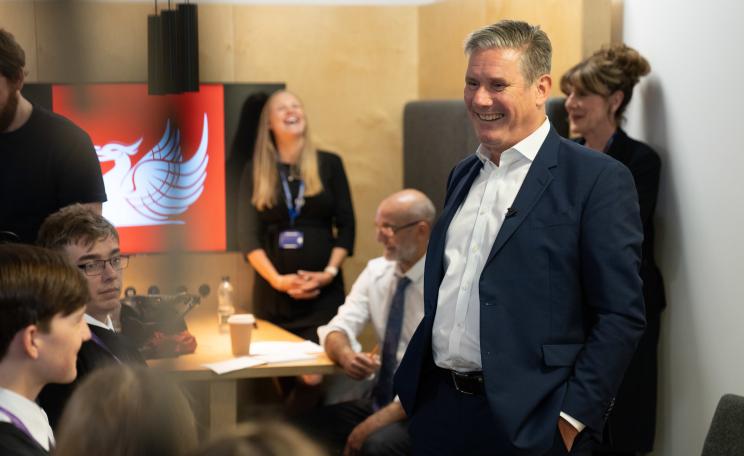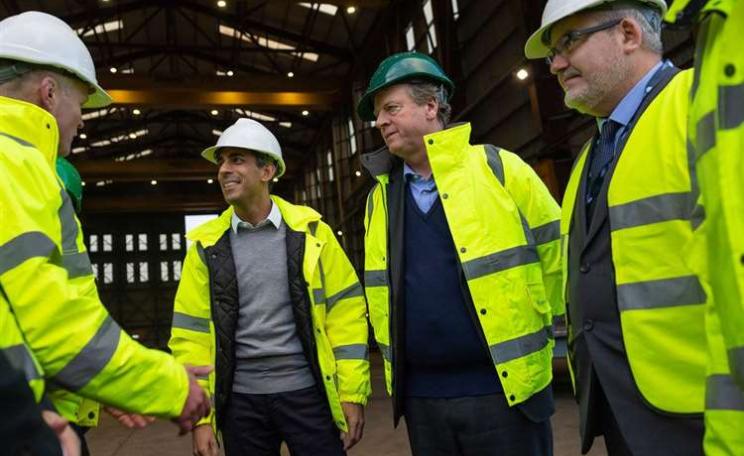If you want a vision of our green future, imagine a Millennial working a zero-hour contract in a care home, looking after a lonely bed-ridden Boomer – forever
From the current talk of green jobs by the Tories to Labour’s Green Industrial Revolution; the talk of thousands of green jobs by the CBI to the Green New Deal, the transformation of the global economy hinges on two things: green investment and the creation of green jobs.
At first glance this seems not only logical – we need to build massive amounts of new infrastructure and new manufacturing capacity in order to create renewable power, electric everything, etc. – but a clear win-win.
We get both growth providing new jobs for those without them, and we stop climate change by doing away with fossil fueled industries. And this is clearly how green jobs are seen by proponents.
Election
During the last UK election, Tees Valley Tory Mayor Ben Houchen talked up the ‘green industrial revolution’, saying it would mean more good jobs, skilled and unskilled, in his area. The CBI has said a green transition will create up to 240,000 new jobs, while unions, NGOs and the Labour Party all talk about the virtuous cycles of green investment leading to new, green jobs.
It’s tempting to write off the Tory plans and CBI figures as either obscuration, warding off actual change through PR, or as indicating just how much money there is to be made through government contracts and largess -as we’ve seen during the pandemic with at least 20% of government contracts showing ‘red flags’ for corruption.
And we shouldn’t under-estimate just how lucrative a return to state-funded, capital-intensive industry could be for business. Green capitalism, after all, holds much promise for profiteering from both ‘greening’ the economy and managing the fall out through security and border industries. But they as much as the Left promoting variations of the Green New Deal all see investment that leads to green jobs as the key for reviving a global economy stuck in the doldrums.
Beleaguered by persistent industrial over-capacity, lack of consumer demand and profitability, low returns on innovations and rising raw commodity prices, ‘greening’ the economy through government spending and support promises a return to growth, its a shame then that green growth doesnt exist.
The talk of new jobs makes for good headlines. After all, we are in a period of time with persistent under-employment. Zero-hour contracts, the gig economy, people leaving the workforce or being warehoused in universities hoping that when they leave there will finally be a job that means they can pay off their student debt. The political horizon has shrunk dramatically in recent years. We not only don’t have our jet packs, we don’t even have the promise of a permanent job.
If you want a vision of our green future, imagine a Millennial working a zero-hour contract in a care home, looking after a lonely bed-ridden Boomer – forever
Stranded
What we don’t talk about are those jobs that will be lost. We don’t talk about the stranded industries that will be created by the transition to a low carbon economy.
Stranded industries are those industries that have no future. Industries that either can’t be made sustainable, or must be massively reduced in size. They will attract little investment. The experience and skills of those working in them will be of little value. Where they are located will become the rustbelts of the future. They will be economic and social cul-de-sacs.
What industries are we talking about? At a minimum we are talking about coal mining, oil and gas extraction and aviation.
In the UK, the fossil fuel industry provides direct employment to 40,000 people, and indirect employment to 375,000. The aviation industry directly and indirectly employs 500,000 people. We also need to consider other heavy industries such as steel and aluminium manufacturing -where another 40,000 are directly employed.
Presumably the rise of electric cars and trucks will mean the 180,000 people directly and 640,000 indirectly employed by the automotive industry, and the 60,000 truck drivers will be alright. But thousands of others won’t be so lucky. One recent study- looking closely at carbon intensive industries- concludes that in the Yorkshire and Humber region alone there are 340,000 jobs at risk, with 260,000 of these people having “skills that will be in low demand”.
Where
These 260,000 people face a familiar future of job center queues and retraining -no doubt retraining will have a mini-boom as an industry. But retraining to do what and to work where?
No doubt for a few years there will be work retrofitting houses with insulation, or installing heat pumps. Hopefully, unlike solar panel manufacturing in many countries, retrofitting work will be secure, permanent and well paid. Eventually even this will run out however. There will still not be enough green manufacturing jobs for everyone in the UK , certainly not enough to soak up those people who are desperately trying to leave stranded industries.
This is because despite the fervent hopes of green capitalists and Green New Dealers alike, the world is already awash with productive industrial capacity, and many of the new manufacturing jobs for renewable energy and electric cars are in the world’s already-existing industrial centers.
There isn’t room for more. If anything, the world needs less industrial capacity and needs to degrow those hard to green industries like mining, steel making and industrial chemistry.
Perhaps some more employment room will be made through the creation of basic income schemes or 4-day working weeks, or, as during the pandemic, through people leaving the workforce, further exacerbating gender and age inequities and deepening the squeeze on the middle class.
Underemployment
Likely most people will have to find ‘underemployment’ in the only sector that has grown in any substantial way over the past decades – the service industry.
In a global stagnant economy, it has been the service industry – or what Jason Smith calls the servant economy – that has grown, currently employing 82 percent of UK workers. Overwhelmingly this means growth in food and beverage preparation, in retail, cleaning, health and care work.
The biggest service industry employers in the UK are supermarkets, followed by hospitals and charities. And it’s worth remembering that almost 1 in 5 manufacturing workers produce sandwiches for Tesco’s, not high-tech appliances, for minimum wage or less.
But the short to medium term prospects for the service industry in the UK don’t look good.
It’s not only Brexit that is causing problems, but increasing costs, subdued consumer demand, and reduced profitability all impacting on the industries future. Where then?
Care
One answer has been the care sector. Care work – from raising and educating children to looking after the elderly or differently abled – has long been gendered, racialized and under-valued when it hasn’t just been expected to be performed ‘for free’.
Capitalism depends on cheap care – that is, on the reproduction of life being done for either free (naturalized as ‘women’s’ work’ or something done for love) or for minimum wage. It has been argued that the revaluation of this work is the current front line of working class struggle; struggles by teaching and university staff, cleaners, midwives and nurses, unionisation campaigns by care home workers and childcare workers.
Care workers have been at the forefront of struggle in recent years. It’s revaluation could serve as the just basis for a transition to actual green jobs; jobs that are not only ecologically sustainable but socially just.
All of this is true. Yet while it could be, it currently is not. Rates of pay across the sector are low, turn-over is high, and contracts are often zero hours or part time. The sector is populated by small businesses that frequently go bust, and by poor working conditions driven by the need to squeeze a profit out of the sector.
Five percent of the total British workforce – or 1.52 million people – works in adult social care. 80 percent are women, and 20 percent are from Black or Ethnic Minority backgrounds. Most if not all are massively underpaid, earning £8.50/hour. Almost 25 percent are on zero-hours contracts. We find similar stories throughout the care sector.
Cheap
As long as cheap care – like cheap food – props up modern life, pressure will be on the sector to stay cheap to enable the ‘rest of us’ to continue to send out kids to nursery, to be cared for in our old age -on our poor pensions, to have our 15-minute GP visit. Of course, care is already inadequate and a postcode lottery.
It’s what we need, but not in the way government and business sells to us. And if the pandemic is anything to go by, our climate change future will demand ever more care, not less.
Would the sector exist with higher rates of pay and better conditions? Would the retail industry exist without fast fashion, or the hospitality industry without zero-hour contracts and cheap food?
This is the question that sits at the edge of this debate – what does it mean to actually make a socially just, ecologically sustainable economy?
What industries will exist and what kinds of work. This is the horizon of our struggle. Yet on the way there we will have to pass through industries and sectors as they exist now, not as we wish them to be.
This Author
Dr Nicholas Beuret is a lecturer in management and ecological sustainability at the University of Essex. His research has been published in journals including Antipode, Science and Culture and South Atlantic Quarterly.







